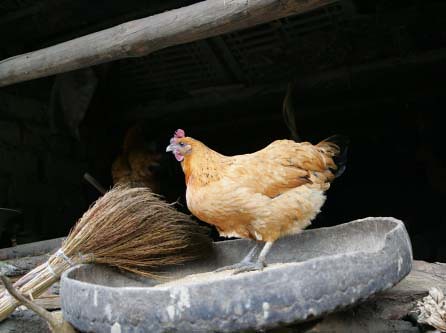A new study of genetic resistance to disease in Ethiopia’s indigenous chicken breeds is scheduled to start later this year. In collaboration with the Ethiopian Institute for Agricultural Research, the University of Liverpool, Roslin Institute, the Univerisity of Edinburgh and the University of Nottingham, researchers from the International Livestock Research Institute (ILRI) will seek to identify ‘the causes of infectious diseases that have a major impact on poultry production in Ethiopia.’
Scheduled to start in September 2010, the study will take place in the district of Jarso, in eastern Ethiopia, and in Horro, in the west of the country. The results of this research will be linked to an ongoing poultry breeding program to improve resistance to ‘priority infectious diseases’ and thereby enhance the productivity of the country’s poultry sector.
Poultry play important economic, nutritional and socio-cultural roles in the livelihoods of poor rural households in Ethiopia and many other developing countries, where birds are widely integrated into smallholder production systems and help households cope with hunger and poverty.
Buying and rearing poultry is often a first step out of poverty. Women tend to own and manage chickens, usually native chicken varieties, which provide them with their only independent source of cash income.
Although breeding programs for local chickens have shown that rapid improvement in productivity is possible, researchers have yet to identify and select the optimal breeds for improving, by, for example, providing resistance to common infectious diseases.
Tadelle Dessie, a team leader of ILRI’s biotechnology theme in Ethiopia, and one of the leaders of the chicken project, says ‘enhanced genetic resistance through selective breeding is still an under-exploited low-cost opportunity for disease control in low-input poultry production systems’. He says the study will investigate genetic variability in the resistance of local chicken ecotypes to major infectious diseases hurting village poultry production in Ethiopia. Results of the research will inform strategies for improving both disease resistance and productivity.
Indigenous chicken varieties are well adapted to local environments, but local birds tend to grow slowly and produce fewer and smaller eggs than commercial varieties. Infectious diseases, however, can wipe out flocks of exotic, higher-producing, poultry.
Knowledge from this study should enable Ethiopian policymakers and animal health professionals to design more precise disease-control plans. The study itself should help improve Ethiopia’s scientific capacity in this field by training local scientists and enhancing laboratory facilities for poultry testing.
Staff are now being recruited for the project, which will be launched in September.

